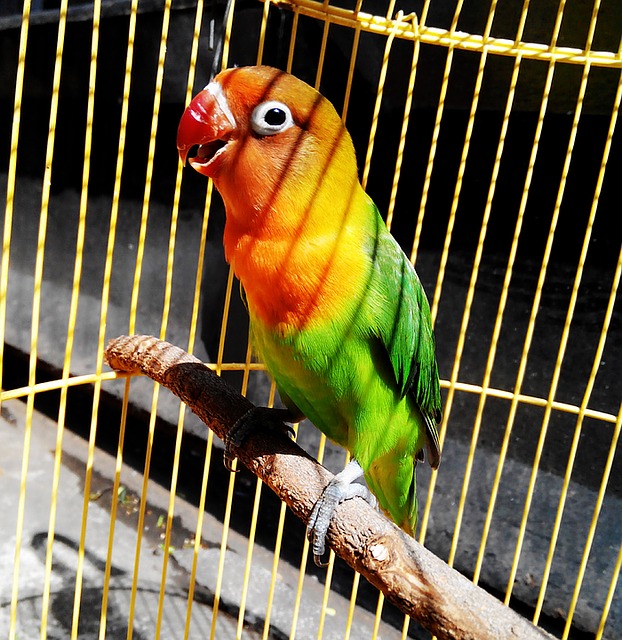Lovebirds will sleep with their eyes closed unless, they’re either extremely relaxed where their eyes remain slightly open or as a result of their environment, where wild lovebirds will keep an eye open intermittently throughout the night to keep an eye on potential dangers from nocturnal predators – referred to as ‘peeking’.
For a more thorough breakdown of why lovebirds may sleep with their eyes open along with the numerous other factors these birds require to get adequate sleep, continue reading.
When Would A Lovebirds Sleep With Their Eyes Open?
In most cases a lovebird will sleep with both eyes closed, as would almost every animal with eyelids however, there are moments within the wild where these little parrots must keep their wits about them, particularly around their newborns.
In cases where predators could potentially be on the prowl for an easy meal, lovebirds are highly likely to have a singular eye open and remain half awake as opposed to completely docile when asleep.
At the same time their brain will remain active periodically throughout the night. This process is referred to as peeking and what this does is allow lovebirds among other avian lifeforms to remain vigilant throughout the night but, also allows them to take rest enough to function adequately in the day that follows.
In short, they’ll generally only sleep with their eyes open, and even then only with 1 eye open at any give time.
This is obviously a more useful lifesaving practice in the wild as opposed to domestic environments where the danger levels are much lower.
That being said if a lovebird is accustomed to this peeking, they may continue to do it inside domestic habitats even if it isn’t necessarily the most practical thing to do.
Why Would A Lovebird Sleep With Their Eyes Open?
Lovebirds will only keep their eyes open when sleeping in a peeking like state so they can remain vigilant in more dangerous terrain, or when looking out for predators when protecting their own fledglings.
As mentioned above they will only have one eye open at one time intermittently throughout the night, with half of their brain active to minimize the energy needed to maintain the activity for as many days as they need.
Do Lovebirds Need Darkness To Sleep?

When the sun goes down, as lovebirds aren’t nocturnal, it’s very likely that they’ll prep themselves for their slumber at night. Therefore, darkness plays a major factor, or at the very least signals to a lovebird that it’s probably time to get some shut eye and energize themselves for tomorrow.
In theory it is possible for lovebirds to sleep when the Sun is up or other lights sources are visible to them however, to get a great nights rest, darkness is very important.
Lovebirds require in the region of 12 – 13 hours of sleep per day to wake up in their best physical state and darkness will be most helpful in achieving a deeper sleep.
Domesticated lovebirds will adapt to your sleep timings too, for example if you leave the lights on or if loud noises are in a lovebirds surrounding throughout their normal periods for sleeping, the quality of these little parrots rest will be compromised.
If keeping the lights on in your house is necessary for one reason or another, the best solution to make sure your lovebird has adequate darkness to sleep within would be to cover their cage up with a thick blanket.
As a result, this should help in minimizing any form of stress and behavioral changes developed due to the lack of sleep.
Do Lovebirds Like Being Covered When Sleeping?
It’s less so about them liking being covered but, more a useful addition in helping these birds maintain a routine sleep pattern, whether the days are longer and the nights shorter.
Just like closing the curtains and turning off the light helps us get into the right headspace for sleep, covering a lovebirds cage with a blanket signals the same thing for them and allows for a more fulfilling sleep.
Can Lovebirds Sleep With The Lights On?

Theoretically it is possible as the odd few who have terrible vision for example could fall asleep even if the lights are on.
However, most will struggle to shut off as their instincts have developed to stay awake in these condition, as their body is wired (wild lovebirds in particular) to forage for food or be wary of predators when the Sun is shining.
Now if the lights were on but, you decided to place a blanket over their cage to simulate darkness, in this situation it realistically would be possible for lovebirds to sleep even with the lights on.
Summary
Sleep is a very important for almost animals so it makes sense that lovebirds would need it to function properly throughout the day.
However, when push comes to shove and there are more important things for these birds to look after, particularly new born lovebird fledglings, they will utilize the practice of peeking.
This essentially requires that they keep one eye open intermittently when resting to watch out for any potential threats that could seriously harm them or their kin.
Amhil Khan, a dedicated nature enthusiast and the founder of BirdsOfTheWild.com, is a passionate advocate for the captivating world of avian wonders. With a deep-seated curiosity about the intricate lives of birds, Amhil’s journey began as a fascination and has evolved into a mission to inspire others to appreciate and protect these magnificent creatures.
Amhil’s love for birds led to the creation of Birds of the Wild, a platform where his expertise in ornithology, coupled with his captivating storytelling, provides readers with an immersive and educational experience. Through his lens and words, he captures the essence of birds in their natural habitats, offering a glimpse into their behaviors, migrations, and the ecosystems they inhabit.

